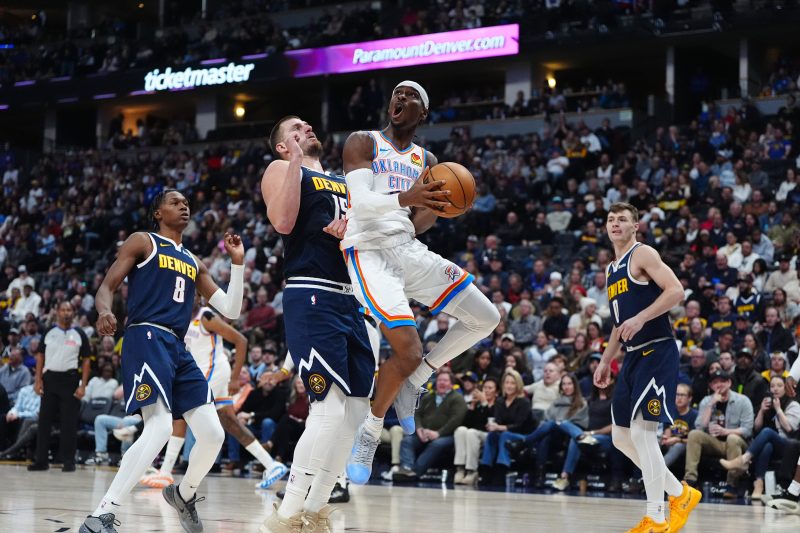The NBA All-Star break has come and gone, and, if top contenders want to launch deep runs, even they have to find ways to improve.
No team is perfect, and it’s usually the teams that adapt to their weaknesses that last.
In the Eastern Conference, the Cleveland Cavaliers, Boston Celtics and New York Knicks have the three best records coming out of the All-Star break. In the Western Conference, it’s the Oklahoma City Thunder, the Memphis Grizzlies and the Denver Nuggets.
Here’s one thing each of those teams must do if they want to launch an extended run in the NBA playoffs.
Eastern Conference
Cleveland Cavaliers (44-10)
Must sharpen third-quarter defense
They have no problem scoring points. But there have been plenty of games this season when the Cavaliers have come out of halftime far too lackadaisically on defense. Overall, Cleveland gives up a respectable 111.5 points per 100 possessions, eighth-best in the NBA. In third quarters, that number swells to 119.4, which is telling when compared to its totals in the first (105.5), second (109.1) and fourth (111.8) quarters. Yet, Cleveland’s defense can completely devolve in some third quarters, making it incredibly difficult to claw back late; the Cavaliers rank dead last in the NBA in third quarter defensive rating in losses, giving up an astounding 132.2 points per 100 possessions.
Boston Celtics (39-16)
Must reduce reliance on 3-point shot, especially when they’re not falling
When the Celtics are hitting their 3s, they’re close to unstoppable. Sometimes, however, the team — bolstered by the fact that every starter and nearly every player on the roster can hit 3s with decent efficiency — tries to will itself out of deficits and shooting slumps when attacking the rim would lead to higher efficiency. Boston ranks 25th in the NBA in 3-point shooting percentage in losses (32.3%).
New York Knicks (36-18)
Must tap into depth, or find new sources of it
No five-player lineup has more minutes (806), points (1,977), field goals made (755) and attempted (1,482), 3 pointers made (188) and attempted (514), rebounds (705) and assists (506) than the Knicks starting five, who also lead in plus-minus (+97). In some cases, the discrepancy between this lineup and the next closest is comical; they have 778 more points than the Timberwolves’ starters, and 778 points would rank fourth-most in the NBA, above Boston’s starters. But there’s a drop-off when New York hits its bench and, come playoff time, when wear-and-tear injuries play a factor, a lack of depth could portend an early exit.
Western Conference
Oklahoma City Thunder (44-10)
Other scorers must step up
The Thunder rely far too much on MVP candidate Shai Gilgeous-Alexander and, to a lesser extent, young All-Star Jalen Williams. Gilgeous-Alexander accounts for 27% of his team’s points, most in the NBA. When he’s on the floor, the Thunder score 121.5 points per 100 possessions, which would rank second in the NBA; with him off, Oklahoma City’s offensive rating plummets to 105.2, which would be last, below the Wizards (105.7).
Memphis Grizzlies (36-18)
Must embrace discipline and limit fouls
Memphis is young and prone to mistakes. The Grizzlies rank second-to-last in the NBA in turnovers per game (16.6). They also rank second-to-last in fouls per game (21.1), which leads to a 28th-worst 24.6 opponent free throw attempts per game. The Grizzlies are aggressive and play fast. Veteran teams with savvy players will know how to exploit that.
Denver Nuggets (36-19)
Defense in the paint must improve
It’s tough to find fault in Nikola Jokić’s game, given that he’s averaging a triple-double and leads the NBA in player impact estimate (21.2), which is a percentage of positive outcomes in a game to which a player contributed. Yet, low-post defense is not a strength, and it’s the one area where teams often exploit Denver’s defense; the Nuggets rank 26th in both opponent points in the paint per game (50.8) and opponent field goal percentage on attempts from five feet or fewer (65.4%).
